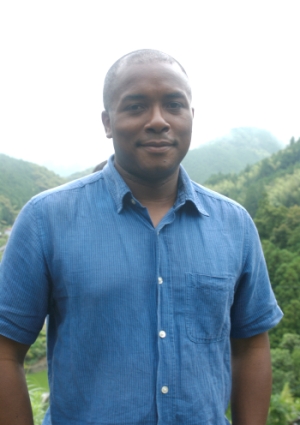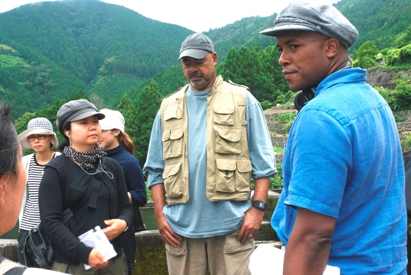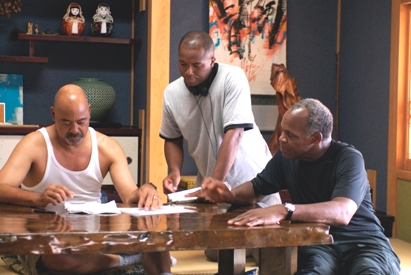Aaron Woolfolk bridges gap between cultures and filmmaking
The Harimaya Bridge has the distinct honor of being the first feature film in the Japanese film industry to be directed by an African American.
Writer/Director Aaron Woolfolk on location in Japan.
Writer/Director Aaron Woolfolk with crew members on location in Japan.
Writer/Director Aaron Woolfolk explains a camera mark to actor Ben Guillory with the help of crew members in Japan.
Writer/Director Aaron Woolfolk works out a scene with actors Ben Guillory and Danny Glover in Japan.
By Brandon I. Brooks
Sentinel Entertainment Editor  Â
Writer and director Aaron Woolfolk has the distinct honor of being the first African American to direct a feature film in Japan. The historic film titled “The Harimaya Bridge,†is a drama about an American man who must travel to rural Japan to claim some important items belonging to his late son, from whom he was estranged. While there, he learns several secrets his son has left behind.Â
The story takes place in Kochi Prefecture, a deeply rural part of Japan where traditional customs remain strong. The film addresses the bond and conflict between father and son, as well as the prejudices that often exist between people of different backgrounds.
Born and raised in Oakland, California Aaron Woolfolk received his undergraduate degree from University of California at Berkeley while majoring in both ethnic studies and rhetoric. After graduating from Berkeley, Woolfolk went on to teach in Japan under a newly developed program called the JET Program – Japan Exchange and Teaching Program. The JET Program is sponsored by the Japanese government and the goal is to bring young people from the western world to Japan to teach in public schools. Woolfolk worked in rural Japan as a junior high school English teacher.
“I actually lived there for a year,†said Woolfolk. “I had planned to stay there much longer but I had applied for film school at Columbia University. I kind of applied like as an afterthought, not expecting to get in because I wanted to stay in Japan. I got in (Columbia) and at that time and I guess it’s still the same way now it’s so hard to get into a top film program and they wouldn’t let me defer, so I went to New York City to Columbia and enrolled in the graduate film program. So I did that but I still felt that my Japan experience was incomplete. So what I would do is I would go back and forth between New York and Japan, just to visit and just to hang out. And it was in those trips back forth I started to think it might be interesting to combine my interest with film with my interest in Japan.â€
Woolfolk started to think up stories that he could perhaps create one day in Japan.  So for his thesis project at Columbia University, Woolfolk went back to rural Japan and made two short films, “Eki (The Station)†and “Kuroi Hitsuji (Black Sheep).†Woolfolk’s short films have done extremely well receiving many accolades and awards at international film festivals, and continue to be featured on cable television. Â
After the success of his short films, Woolfolk went on to receive a development grant from ABC Talent and was later a 2004-2005 Walt Disney Studios/ABC Entertainment Writing Fellow. His play, Bronzeville (which he co-wrote), premiered in Los Angeles in 2009 and was nominated for a 2010 Ovation Award in the category Playwriting for an Original Play.Â
“The Harimaya Bridge,†is Woolfolk’s first feature film. The movie was shot on location in Japan and in the United States. Woolfolk actually came up with the title of the film. Harimaya Bridge is a famous folk tale from the area of Japan that Woolfolk lived in when he taught there. The folk tale is about the forbidden love of a monk and a woman and it’s a very important symbol of that part of Japan.Â
“So I wanted to use it (title of the movie) for a few reasons,†Woolfolk shared with the Sentinel. “First, because it identified with that part of Japan that I made the movie. Second of all, it’s a metaphor for the story, like there is forbidden love in the story and also just a metaphor of just a bridge. Like Daniel the main character, he has to go on a bridge between two different cultures. In fact there are several characters in the story that cross bridges over the course of the story. People are crossing bridges between races, between countries, even between generations for example.â€Â
“I want to do work where people of color can be the norm because we are the norm,†said Woolfolk. “Not be constrictive by these boxes. So with “The Harimaya Bridge,†I wanted to get out of that. There are many kinds of black folks who talk many types of ways, who look many types of ways, who have many types of experiences.â€Â
It’s important to note that the film would have never come to life if it wasn’t for the interest and the financial assistance of Danny Glover. Glover was one of three executive producers on the film and was the only American executive producer to assist the project. In addition to producing, Glover also co-stars in the film as “Joseph Holder,†the brother of the main character, “Daniel Holder,†played by legendary actor and long time friend Ben Guillory.  Â
Glover and Guillory founded the Robey Theatre Company and have been operating the nonprofit for over 25 years. A friend urged Woolfolk to reach out to Glover and Guillory and apply for the Walt Disney Development Grant through the Robey Theatre Company.Â
“I applied for the grant through them (Robey Theatre Company),†said Woolfolk. “So Disney gave me the grant and they also gave Robey (Theatre Company) a grant for sponsoring me as well. So I got to know Danny and Ben that way, they got to know my work and then they read it (“The Harimaya Bridge†script) and they were really supportive of it because it was different but they liked the message of it. So that’s what got it started and then when I approached Danny about actually being in the film and executive producing it, he was really happy to do it. He and Ben Guillory are very supportive of young artist, up and coming people.â€Â
 When asked about his participation in the film, Glover shared that he and Guillory continuously search for projects that express certain themes about relationships among people. Glover feels that Aaron’s script has great potential to bring people together, no matter what cultural differences they have. Glovers words proved to be valid because after a nationwide theatrical release of the film in Japan during the summer of 2009 the film has been met with critical acclaim.  Â
“The biggest difficulty was finding the financing and money,†said Woolfolk. “That is always the biggest difficulty. After that it’s easy. Even the difficult things are easy.  So I mean I am so fortunate that things came together and the timing was right and I met the right people especially the right people over in Japan who really believed in the film and actually the studio who made the film. They liked the fact that the main characters were African American because for them that was different, that was edgy. And the head of the studio that made the film, he is into doing things like that and doing things that are different and tell a good story. He really liked the fact that here are black characters and Japanese characters  but it’s really a universal story that applies to anybody. And I actually found that the audiences, no matter where I am at, feel the same way. A lot of white people have said how much they love the characters and how much they identify with the character which is kind of what I wanted to do. I wanted to make a universal story that just happened to be about black folks because I wanted to put those images of black folks out there but at the same time I wanted them to represent people.â€










